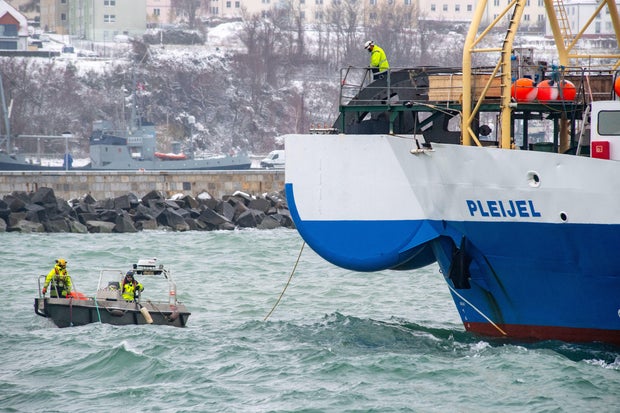Undersea cables have been cut or damaged, leading European countries to investigate possible destruction

Two submarine cables carrying internet data deep in the Baltic Sea have been damaged, European telecommunications companies said this week, issuing warnings to European governments about Russia’s “coordinated war” targeting telecommunications infrastructure around the world.
On Wednesday, interest was focused on the Chinese-flagged cargo ship Yi Peng 3, which information provided by the vessel tracking service Vessel Finder showed was in the area when the cables were damaged.
The Yi Peng was stopped on Wednesday in Danish waters, and the Danish military confirmed in a brief statement posted online that they were near the vessel, without giving further details. Vessel Finder tracking data showed a Danish navy vessel close to a grounded cargo ship.
According to data from Vessel Finder, a bulk carrier owned by China’s Ningbo Yipeng Shipping Co. Ltd, from the remote northwestern Russian port of Ust-Luga on Nov. 15, with a scheduled arrival on Dec. 3 in Port Said, Egypt.
Stefan Sauer/photo alliance/Getty
Speaking to reporters on Wednesday in Moscow, Kremlin spokesman Dmitry Peskov denied that Russia was involved in the damaged cables, saying “it makes no sense to keep blaming Russia for everything without reasons.” Peskov suggested that Ukraine may be behind the sabotage.
Finnish company Cinia confirmed that its submarine cable between Finland and Germany was damaged in the early hours of Monday. The cable is approximately 730 miles long and connects telecommunications networks in central Europe to Finland and other Nordic countries.
“The details of the error were not yet known and are currently being investigated,” the company said in a statement on its website.
The foreign ministers of Finland and Germany in a joint statement on Monday said that the cable connecting the two countries has been cut and that these incidents have led to allegations of vandalism.
“A thorough investigation is ongoing. Our European security is not only at risk Russia’s war of aggression against Ukrainebut also hybrid wars of brutal actors,” the ministers said, without blaming any particular organization for the potential destruction.
Swedish company Arelion confirmed to CBS News on Tuesday that one of its cables was also injured, on Sunday morning.
“We can confirm that one of our subsea fiber cables – the one between Gotland, Sweden and Šventoji, Lithuania – has been damaged. This issue was discovered on November 17, and we currently do not know the cause as we have failed to check the cable,” said Arelion spokesman Martin Sjögren. he told CBS News.
“Arelion is in contact with the Swedish authorities and the Swedish military regarding this incident. The cable will be repaired in the next few weeks depending on the weather,” he said.
The Swedish prosecutor’s office confirmed to CBS News on Wednesday that there is an ongoing investigation into the “destruction of the Baltic Sea.” In a separate statement, Sweden’s national police force confirmed that, “it is also interested in the vessel seen in the areas in question. [the ship] it is currently not in Swedish waters.”
“If I had a nickel for every time a Chinese ship drags anchor under the Baltic Sea near important cables I would have two nickels, which is not much, but it is surprising that it happened twice,” Lithuanian Foreign Minister Gabriyelius Landsbergis said in a statement posted on social media.
Audrius Stasiulaitis, a spokesman for Swedish telecommunications company Telia, which owns and operates the Arelion cable, said on Tuesday the company believed the cable was damaged.
“We can only speculate about what happened, but as far as we’re concerned, it’s not affected by a mechanical malfunction and we think it’s a physical injury,” he told CBS News on the phone.
The damage to the cables comes after reports last year that Russia may be targeting key infrastructure linking the Nordic countries.
An April 2023 joint investigation by the public broadcasters of Sweden, Denmark, Norway and Finland found that Moscow was operating suspected spy ships in Nordic waters as part of a Kremlin campaign likely aimed at targeting underwater cables and wind farms.
There was attacks on European infrastructure since Russia was introduced its full invasion of Ukraine 1,000 days ago.
In September 2022, the Nord Stream 1 and Nord Stream 2 pipelines, both designed to carry natural gas from Russia to Germany under the Baltic Sea, were damaged by an explosion.
Both Ukraine and Russia have denied involvement in the explosion. In August, German media reported that prosecutors had issued a statement a warrant for the arrest of a Ukrainian man on top of the pipe attack.
Sweden and Finland both joined the NATO military alliance In the past two years, as the war in Ukraine has fueled concerns about Russia’s possible intentions, and this week, both countries have revised their war preparedness guidance and published online brochures for citizens to prepare for war or other disaster.




